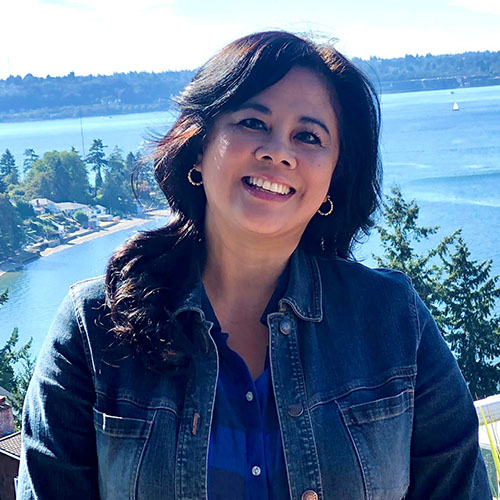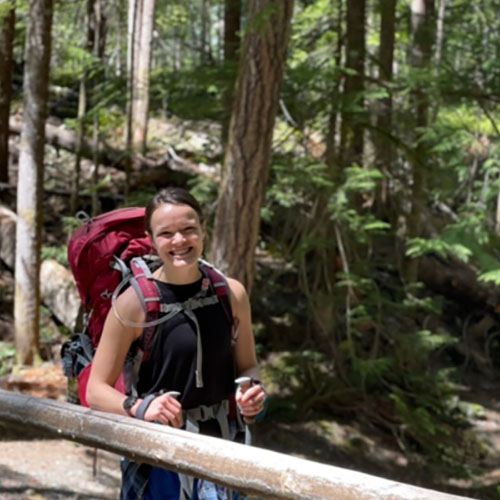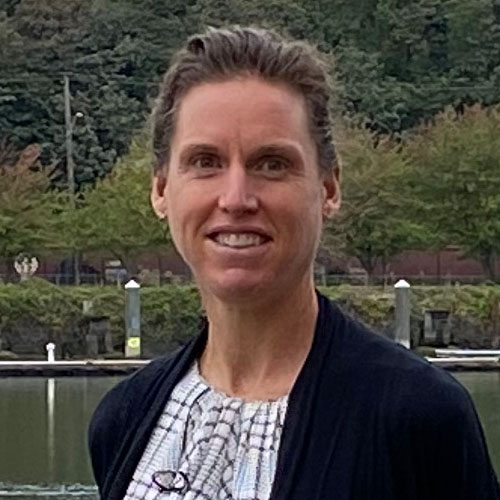Main Content
Susan Ramos
Taking Care of Others is Noble

Susan Ramos, a graduate of UW Tacoma’s School of Nursing and Healthcare Leadership’s Master of Nursing program, is the Clinical Director of Behavioral Health Network at MultiCare Tacoma. She earned her Bachelor of Science in Nursing from UW Seattle.
Healthcare, especially mental health care, has always been part of her life. Her mother and uncle are both psychiatrists and her father was a social worker. In her upbringing and in her Filipino culture, a profession that helps and heals others has always been considered noble. For these reasons, she knew from a young age that she wanted to pursue a career in healthcare.
After working initially in an inpatient behavioral health hospital, Susan went back to her passion in pediatric nursing. She was a part-time school nurse and primary care pediatric nurse. Susan eventually worked her way to hospital care management and utilization management for behavioral health. During this time, she witnessed a large surge of kids with mental health crisis coming to the emergency department during the COVID pandemic. Her experience in pediatric primary care, school nursing, and pediatric hospital inpatient treatment gave her a unique perspective, witnessing the gaps in mental healthcare firsthand. She noticed the lack of support and resources for youth mental health population. Youth in crisis and/or having mental health challenges would sometimes have to wait three to six months to get the care they needed from a psychiatric provider. If they needed medication management, waiting three or six months was too long, and they ended up in emergency rooms.
Due to her lifelong interest in community work and the lack of mental healthcare support for students, Susan co-founded Commencement Behavioral Health (CBH) with Dr. Lucas McIntyre in 2021. It is a triad community coalition model among three major systems:
- MultiCare - a behavioral health system
- UW Tacoma School of Nursing and Healthcare Leadership - an educational research system
- Tacoma School District – a local school system
This coalition focuses on education for mental health awareness, coping strategies for mental health crisis, depression, anxiety, and suicide ideation in the school system.
CBH launched their first program earlier this year, a Provider Consultation Program for School Mental Health, led by Dr. Lucas McIntyre, a Child and Adolescent Psychiatrist. Dr. McIntyre and Susan created the Consultation Program with Tacoma School District’s counselors. This program consists of a monthly meeting with the MultiCare behavioral health provider and the school counselors or school staff who are dealing with student mental health crisis situations and seeking advice on case examples. Once a month, they talk about case studies with counselors. Teachers and school nurses are invited to participate as well. Dr. Chieh Cheng, an Assistant Professor at UW Tacoma’s School of Nursing and Healthcare Leadership is studying what the outcome is and the efficacy of the Provider Consultation Program for School Mental Health.
One of the other coalition programs is to give Teen Mental Health First Aid (MHFA) to 13 to 17 year-old students in high school and to serve as consultants for an evidenced-based peer support program. It follows a Multi-Tiered System of Supports (MTSS) model which is a framework used by the Washington Office of Superintendent of Public Instruction (OSPI). This Peer Support Program for School Mental Health provides mental health support to school youth.
Susan hopes to implement the MHFA Training and Peer Support Program sometime in Autumn 2022 or Spring 2023.
- Through this program, Susan and several MultiCare social workers will be fully trained and certified instructors for Youth and Teen MHFA.
- They would then train the 62 high school students in the Tacoma Public Schools’ Career program that are interested in behavioral health careers.
- These students would get trained and certified in Teen MHFA which is an eight hour training course. It is similar to getting CPR certified.
Tacoma Pierce County Health Department (TPCHD) reached out to Commencement Behavioral Health to collaborate with them. TPCHD’s goal is to train 70% of 10th graders in MHFA in Pierce County. Once the Peer Support Program is implemented, Susan would like to have high school students certified in MHFA do fun mental health awareness activities at elementary schools using evidence-based programs in collaboration with Tacoma Public School District teachers and school counselors. She would like to give students better tools and strategies for coping with stress and change at an early age, so by the time they reach high school, they will be better equipped to handle mental health crises. Susan would love to be able to replicate these programs in other school districts in the state of Washington and beyond.
Would you like to learn more about SNHCL MN alumna, Susan Ramos?
Listen to our Podcast: SNHCL Meet & Greet on December 1, 2022!
Bao Nguyen
Supporting Communities of Color and Underserved Patients
Bao Nguyen graduated from UW Tacoma’s Bachelor of Arts in Healthcare Leadership in June 2022 and previously completed her Bachelor of Science in Biology at UW Seattle in 2020. Her goal has always been to become a physician. However, she decided to study the Healthcare Leadership program because she is interested in the public health aspect of healthcare and wanted to gain more knowledge and skills related to laws, technology, and management in healthcare in order to become a better physician. She thinks this program opens doors in healthcare and students get the opportunity to see other healthcare professions. She is applying to medical schools now and hopes to start in Fall 2023.

Bao’s interest in diversity, health advocacy, and working with underserved populations, led her to participate in a paid 14-month community-based research initiative led by Dr. Sharon Laing, Associate Professor at UW Tacoma’s School of Nursing and Healthcare Leadership. The initiative was supported by the UWT Strategic Initiative Fund and was written to support BIPOC healthcare leadership students to engage in empirical research at the undergraduate level and thus, supporting success post baccalaureate studies. The research involved three BIPOC students (Vietnamese, African and African American) working together with their respective communities to understand the impact of the COVID-19 pandemic on their families and personal well-being. Bao's research addressed the physical, mental, and environmental impact of COVID-19 on the Vietnamese community in Washington State and Boston, Massachusetts. Working collaboratively with her research team and mentor, Bao assisted in the development of the IRB proposal, helped develop the research protocol, constructed focus group questions, recruited and interviewed Vietnamese participants, and analyzed the data. She asked participants about their personal experiences during the COVID-19 pandemic. Bao is currently working on publishing her findings with the support of Dr. Laing.
Her preliminary findings saw that there was emotional strain attributed to family tensions due to caregiving, youth academics, and family conflicts due to living in a constrained place. In general, the Vietnamese community accepted their struggles as inevitable and felt powerless to continue on during the pandemic. Bao mentioned that Asian American exceptionalism exists, meaning there is a high expectation to become successful so fear of stigma prevents the Vietnamese to seek mental health support and are controlling the decisions of their children. There was a lack of social cohesion among the Vietnamese, and the community infrastructure is small and not strong enough. She thinks we can build supportive systems to help people, in particular, immigrants and the Asian Pacific Islander communities, to better cope and thrive from difficult situations through education, counseling, and family relationships.
Bao received notification of acceptance to present her research at two venues: Washington State Public Health Association (WSPHA) and the American Public Health Association (APHA) in October and November respectively of this year. She would like her research to reach policy makers and healthcare professionals as well as help raise the voices of her community members – immigrants and the vulnerable Vietnamese population. She hopes her research makes a difference among the vulnerable Vietnamese population and helps them to navigate the potential barriers involving language, life, and seeking healthcare.
This research has shaped what Bao’s interest may be in the future as a physician. She is interested in supporting health justice, health equity, diversity and advocating all this in schools and in the community.
Would you like to learn more about BAHCL alumna, Bao Nguyen?
Listen to our Podcast: SNHCL Meet & Greet on October 3, 2022!
Caterina MacDonald
Passion for Helping Patients and Educating Nurses
Caterina MacDonald is a current student in the Master of Nursing (MN) Program at UW Tacoma’s School of Nursing and Healthcare Leadership and works in the bone marrow and immunotherapy department at the University of Washington Medical Center in Mountlake. She earned her Bachelor of Science degree in Nursing from the University of Michigan. After obtaining her bachelor’s degree, she worked as a nurse technician in the oncology department where she fell in love with helping patients. She is interested in the clinical aspect of nursing and enjoys doing research.

Through UW Tacoma’s MN program, she found lifelong mentors: Dr. Weichao Yuwen, Associate Professor at UW Tacoma’s School of Nursing and Healthcare Leadership and Dr. Kathleen Shannon-Dorcy, Nurse Scientist and Director of Research, Scholarship, and Program Development at Fred Hutch Cancer Center. Bringing education and leadership together, Caterina was also the student representative in the Graduate Program Curriculum Committee for UW Tacoma’s School of Nursing and Healthcare Leadership.
Caterina’s practicum was as an assistant teacher to Dr. Shannon-Dorcy at Seattle University who at the time also taught Quality and Safety at UW Tacoma. In addition to teaching, Caterina was responsible for survey development and having one on one conversations with interviewees regarding their reactions to a medical student’s illustrations of black patients. The focus of the interviews was to gather data on the community’s reactions to these illustrations since at the time, medical textbooks only contained illustrations of white patients. She also helped with applications for accreditation renewals for nursing continuing education courses. Caterina was involved in creating an objective in each of the courses to implement implicit biases and develop preceptor courses at the Fred Hutch Cancer Center.
Dr. Yuwen served as Caterina’s chair for her scholarly inquiry project. Her research focused on answering “Is enteral nutrition more beneficial than parenteral nutrition through the veins in bone marrow transplant patients” and how to support nurses through this practice change. Previous practice research found nursing as a barrier to change since nursing thought enteral nutrition was invasive. She wanted to debunk that myth. She implemented an education webinar via Zoom to support the nurses at Fred Hutch and then did pre and post surveys. The survey results showed that the nurses had more knowledge and thought their patients would benefit more from the enteral nutrition. They also felt more comfortable than before attending the education webinar about implementing the change. The education webinar was effective because the nurses received the education from a peer in a peer setting, and the nurses could ask questions. Caterina’s webinar will continue to exist in Fred Hutch’s education database for future use.
Caterina is passionate about helping patients and educating nurses to navigate around changes. She is truly a champion of both patients and nurses, and hopes to continue serving patients and nurses in her career.
Would you like to learn more about SNHCL current MN student, Caterina MacDonald?
Listen to our Podcast: SNHCL Meet & Greet on November 1, 2022!
Join the SNHCL Newsletter Mailing List
The School of Nursing and Healthcare Leadership sends out a quarterly newsletter that includes updates of alumni, faculty, and the SNHCL community. If you would like to receive the newsletter, complete this form to be added to the mailing list.
Archive
- Autumn 2022
- Winter 2023
- Spring 2023
Dr. Katie Haerling
Preparing the Next Generation of Healthcare Professionals

Dr. Katie Haerling is a Professor at UW Tacoma’s School of Nursing and Healthcare Leadership. She earned her Bachelor of Science in Nursing at UW Seattle and then joined the Navy as a Nurse Corps Officer. She discovered her interest in teaching and learning while training hospital corpsmen during her service in the Navy. She earned her Master of Nursing (MN) at UW Bothell and Ph.D in Nursing at Washington State University. Before joining UW Tacoma, she spent a year in Botswana doing global health research in HIV/AIDS with the Botswana Harvard AIDS Institute Partnership as part of the Fogarty International Clinical Research Scholars Program.
Dr. Haerling’s main line of research focuses on the use of simulation in nursing education and how to assess participant’s performance in simulation activities. Her research mission is “to help identify the most effective and efficient ways to prepare the next generation of healthcare professionals and contribute to the evidence-based supporting better healthcare education."
Her current research comparing learning and patient performance outcomes between students who participate in virtual (screen-based) simulation, mannequin-based simulation, and traditional clinical activities is funded by the National Council of State Boards of Nursing Center for Regulatory Excellence. She is the principal investigator on the project but emphasized that the 2-year project has been a collaborative effort with the WA State Department of Health Nursing Care Quality Assurance Commission, UW Tacoma MN students, and nursing programs, faculty, and students from across Washington State.
She mentioned that current guidelines allow up to 50% of required clinical hours to be replaced with simulation and that some evidence suggests simulation may be more efficient than traditional teaching and learning strategies used in nursing education. Her findings will be presented in Autumn 2022 and published sometime next year. At that time, we will be able to share the findings with you.
In addition to applying her research to the classes that she teaches in the MN Nurse Educator track and undergraduate research classes at UW Tacoma, she is hoping her research will inform policy on how nurse education is regulated, administered, and practiced.
Would you like to learn more about Dr. Katie Haerling?
Listen to our Podcast: SNHCL Meet & Greet on January 2, 2023!

Fun Fact Question
Which faculty or staff at UW Tacoma's School of Nursing and Healthcare Leadership has competed in four ironmans? Submit your response by commenting to this post on our facebook page.
a) Associate Professor: Dr. Robin Evans-Agnew
b) Associate Professor: Dr. Susan Johnson
c) Academic Advisor: Johnica Hopkins
d) Professor: Dr. Katie Haerling
